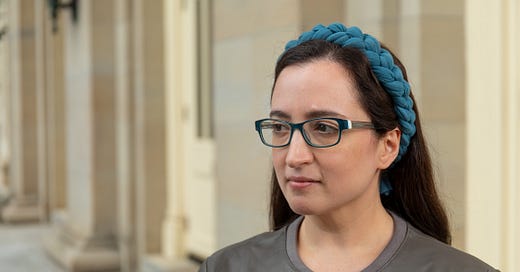What is philosophy to you?
I’m going to take a slight liberty with this question of interpreting it not as a definitional or constitutive one, about what I take philosophy to be. (I despair of giving even a loose characterization of what counts as philosophy, let alone necessary and sufficient conditions—for both substantive and political reasons crystallized by the philosopher Kristie Dotson.) Instead, I’ll say something about what philosophy means to me, and why it has been liberating, as someone with the particular temperament I have. Anyone vaguely familiar with my work, which has lately been mostly on misogyny and fatphobia, might be surprised to learn that I’m very much a norm-follower. That is, I like and value being able to adhere to social norms and conventions and being socially appropriate and cooperative, if it doesn’t compromise my ability to live up to other values or needs (as unfortunately it often does, in the unjust world we occupy). Yet I’m also a fairly argumentative person, who sometimes disagrees strongly with conventional wisdom, and wants the freedom to flatly deny what other people have maintained if I’m not convinced by their evidence or their argument. Philosophy, which thrives on argumentation, is thus the perfect disciplinary home for me: it makes being disagreeable no longer normatively verboten, as it often is for women in particular, but something socially expected and even a professional obligation. And of course, you get to dispute norms that you think are harmful and impose on us pseudo-obligations, which is my main driving motivation as a moral and feminist philosopher.
How were you first introduced to philosophy?
I think I must have been about five when the philosopher Raimond Gaita, my father’s best friend, challenged me as to why I felt entitled to catch butterflies in my net. “It’s not up to you,” was my not-so-convincing rejoinder. But his question stuck with me for a long time, and I felt guilty for interfering with the life and freedom of these beautiful creatures just for my own curatorial enjoyment. I think it was my parents who explained what Rai did and what his question was an example of: philosophy, or thinking about thinking. Again, it’s hardly a complete definition (it doesn’t even clearly apply to the butterfly case). But it resonated and got me curious. Eventually, in my teenage years, I started reading some of the philosophy books in the house—Rai’s wonderful work included. I knew then that I wanted to study philosophy in college. I got hooked during my first semester, especially when we turned to the problem of determinism and free will. Philosophy struck me as harder, and more fun, than anything I’d ever set my mind to.
How do you practice philosophy today?
I think of myself as very much driven by certain questions. Lately: how should we understand misogyny? How should we understand fatphobia? I think of these questions as profoundly, but not exclusively, philosophical. They also required getting deep into certain kinds of empirical literature—on the hostility toward powerful women, and the complex relationship between weight and health, to name two obvious examples—and paying careful attention to a lot of testimonial evidence from people who occupy social positions I don’t, who can illuminate intersections of misogyny and fatphobia that are bound to escape me. So I’m inevitably reading work from thinkers and activists coming from a wide range of perspectives, both inside and outside the academy, as well as engaging with other philosophers and applying my philosophical training in ways that are hopefully fruitful given the questions that grip me.
What is a philosophical issue that is important to you?
I’m fascinated by the metaethical question of where morality comes from, or what constitutes its source. I regularly teach classes and seminars that feature the work of Hume, G.E. Moore, J.L. Mackie, Bernard Williams, Philippa Foot, Peter Railton, Simon Blackburn, Jamie Dreier, Steve Darwall, Christine Korsgaard, Ruth Chang, Mark Schroeder, my colleague Julia Markovits, and my dear, late colleagues, Nick Sturgeon and Dick Boyd, among many others. And I have developed what might be loosely thought of as a feminist answer to the question of morality’s source, wherein morality has its ultimate source in the bodies of vulnerable people and creatures, which issue in what I call bodily imperatives—I need help, I need sleep, I need food. For me, these imperatives literally constitute moral imperatives—albeit ones that typically compete and sometimes conflict in ways that make this all very messy in practice (and even at a slightly less abstract level of theorizing). But I’m attracted to the idea, familiar in first-order normative ethics, that trying to bring about a world where these bodily imperatives are satisfied is what morality is in large part about, somehow (though I don’t necessarily think that some form of consequentialism is the best way to cash out this insight). I’ve recently argued that these ideas impugn practices like diet culture that lead to people making and keeping themselves hungry, for example, and violating their bodily imperatives out of a false sense of moral obligation to be thin. So this is a metaethics with strong normative implications, unlike some—for better or worse.
What books, podcasts, or other media would you recommend to anyone interested in philosophy?
Oof… choosing books feels like playing favorites! But I am a big podcast person, so let me use this opportunity to recommend a few great ones (I am sure I am missing a lot of other great ones too). I love Overthink, hosted by Ellie Anderson and David Peña-Guzmán, Hi-Phi Nation, hosted by Barry Lam, Ordinary Unhappiness, hosted by Abby Kluchin and Patrick Blanchfield, Philosophy Bites, hosted by Nigel Warburton, Elucidations, hosted by Matt Teichman, The Philosopher’s Zone, hosted by David Rutledge, and In Bed with the Right, hosted by Moira Donegan and Adrian Daub. There’s nothing more fun to me than wandering around my house or neighborhood while having these folks imparting interesting ideas directly into my ears.
Kate Manne is an associate professor of philosophy at Cornell University, where she’s been teaching since 2013. Before that, she was a junior fellow at the Harvard Society of Fellows. Manne did her graduate work in philosophy at MIT, and works in moral, social, and feminist philosophy. She is the author of three books, Down Girl: The Logic of Misogyny, Entitled: How Male Privilege Hurts Women, and Unshrinking: How to Face Fatphobia, which came out earlier this year. She writes a newsletter, More to Hate, canvassing misogyny, fatphobia, their intersection, and more. Her academic papers take up questions in metaethics, moral psychology, and political philosophy.







Hi everyone, let's thank Kate Manne again for her wonderful post. It would also be great if comments could be about the content of her lovely piece. I'm sure there are plenty of other venues to debate some of the issues that have come up in the comments. Thank you!
Awesome post! Thank you for contributing and sharing with your readers!